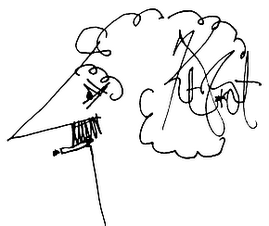The only reason I caught this is that I like reading columns by CW Nevius. Here he offers an obit written long before KV's death. Ironically, the obit writer died before Vonnegut died. Here's the link.
The Best Vonnegut Obit You Haven't Read
Just for a moment of proof that the good men do lives after them, Chronicle copy editor Allen Johnson rescued this obituary of Kurt Vonnegut written many years ago by the late Examiner writer Ed Beitiks. (Obituaries of famous people are often written long in advance of their death.) Beitiks was a fine writer, a very nice man, and someone who passed away much too soon.
Allen sent this to members of the Chronicle staff, but it seemed a shame not to let more people read it.
By Edvins Beitiks
Of the Examiner Staff
In July of 1982, Kurt Vonnegut Jr. rejected attempts by his hometown of Indianapolis to honor him. He refused to attend the ceremonies, saying from his New York City home, ""I personally find it embarrassing. It seems to me this is the kind of thing you do for an author after he's dead.''
In the years since, Vonnegut has played the role of cantankerous jester, outspoken conscience of America, a voice supporting the oddness of this country while warning, ""The system promotes to the top those who don't care about the planet.''
Vonnegut's voice was stilled overnight on Wednesday several weeks after a fall that left him with permanent brain damage, his wife, Jill Krementz, told the New York Times on Thursday.
If there was a quality separating Kurt Vonnegut Jr. from the other World War II vets who turned their talents to the novel, it was a tongue-in-cheekness, a continually raised eyebrow, an inability to believe that all this crazy stuff was really happening. Even Joseph Heller, whose ""Catch-22'' set the tone for postwar insanity, tried to find a plumb line for his world, working it out with each successive book.
But Vonnegut wrote books that threw up their hands at the goings-on, delving into sci-fi when the down-to-earth wasn't enough, or turning to the reader and simply asking, ""Do you know what's going on? Because I'm having problems.''
>Vonnegut wrote 24 books, selling more than 10 million copies, and all 14 of his novels are still in print. His success started with ""Player Piano'' in 1952, followed by ""The Sirens of Titan,'' ""Mother Night,'' ""Cat's Cradle,'' and his most successful book, ""Slaughterhouse-Five, or the Children's Crusade,'' written in 1969. ""Timequake,'' the last of Vonnegut's novels, was written in 1997 to mixed reviews. His last work, "A Man Without a Country," a collection of essays written in reaction to George W. Bush's presidency, was published in 2005.
""Slaughterhouse-Five'' was a remembrance of the firebombing of Dresden on Feb. 13, 1945, seen through the eyes of the narrator, Billy Pilgrim. Vonnegut himself, taken prisoner of war in the Battle of the Bulge, lived through that firebombing, hiding underground below a Dresden slaughterhouse. The war colored his writings, as it did with other WWII vets such as Heller, Norman Mailer, James Jones and Irwin Shaw, but Vonnegut seemed to take it more in stride.
His postwar life was filled with other attacks and tragedies. Vonnegut's older sister, Alice, died of cancer when she was 40, two days after her husband died in a train crash. His son was diagnosed as a schizophrenic.
In 1971, ""Slaughterhouse-Five'' was outlawed in Oakland County, Mich., for its language and its ""degradation of the person of Christ,'' and in 1973 copies of the book were burned by the Drake School Board in South Dakota, a playing-out of Ray Bradbury's fears in ""Fahrenheit 451,'' the temperature at which a book bursts into flame.
Vonnegut, once a public relations man for General Electirc, took a light-hearted look at the world outside as he lazed in the general comfort of postwar America. But by the time ""Bagombo Snuff Box'' was put together he was writing, ""You can't fight progress. The best you can do is ignore it, until it finally takes your livelihood and self-respect away. General Electric itself was made to feel like a buggy whip factory for a time, as Bell Labs and others cornered patents on transistors and their uses, while GE was still shunting electrons this way and that with vaccum tubes ... Too big to fail, though, as I was not, GE recovered sufficiently to lay off thousands and poison the Hudson River with PCBs.'' The short stories in ""Bagombo Snuff Box,'' written from 1949-63, during some of the strongest years for corporate America, are smilingly described by Vonnegut as ""a bunch of Buddhist catnaps.''
Vonnegut, a fourth-generation German-American born in Indianapolis on Nov. 11, 1922, sometimes took delight in the irony of being born on the fourth anniversary of Veterans Day, which ended the First World War. He said he owed his scientific bent to his father, an architect, and his politics to his family's New Leftism, which distrusted all ""granfallons, political or theological.'' After graduation from Shortridge High School in 1940, Vonnegut studied chemistry at Cornell and the Carnegie Institute of Technology before being drated into the Army.
Captured at the Bulge, he wound up in Dresden during the firebombing, which killed 135,000 civilians -- more than Hiroshima and Nagasaki combined -- a firebombing carried out, according to some historians, as a naked demonstration of Allied air power to Russians moving toward Berlin. When he came out of the Dresden bomb shelter, Vonnegut wrote, ""Everything was gone but the cellars where 135,000 Hansels and Gretels had been baked like gingerbread men. So we were put to work as corpse miners, breaking into shelters, bringing bodies out.''
On Sept. 1, 1945, Vonnegut married a childhood sweetheart, Jane Marie Cox, and the couple had three children, Mark, Edith and Nanette. The family also included three adopted nephews, the children of Vonnegut's deceased sister.
After the war Vonnegut studied anthropology at the University of Chicago, worked as a police reporter for the city news bureau, then became a PR man for GE in Schenectady, N.Y., a job he quit in 1950 to turn to full-time freelance writing that included short stories for magazines like Galaxy, Fantasy, Collier's, Cosmopolitan, Saturday Evening Post.
The stories inspired ""Player Piano,'' ""The Sirens of Titan'' (1959) and ""Mother Night'' (1961). After ""Cat's Cradle'' in 1963 came ""Slaughterhouse-Five,'' leading New York Times' critic C.D.B. Bryan to compare Vonnegut to a mix of H.G. Wells and Mark Twain, saying the two messages he found in Vonnegut were ""Be kind'' and ""God doesn't care whether you are or not.''
In 1986, Vonnegut appeared before a Senate subcommittee to argue for repeal of the McCarran- Warren Act, which allowed the State Department to bar foreign visitors whose views were unacceptable to the government. ""All citizens are entitled to hear absolutely any idea anyone from anywhere may care to express,'' he said. ""And where did I get the notion there was such an incredible entitlement? I got it from the junior civics course that was given in the seventh grade at Public School 35 in Indianapolis.''
Vonnegut called censorship ""a disease that's been around a long, long time, like Legionnaires' disease, maybe, or Altzheimer's.'' That same year he appeared at Berkeley's Sproul Plaza to join demonstrations against South African apartheid, and soon after he flew to Mozambique as part of a relief mission.
At the height of his popularity, Time magazine insisted that a sign hanging in his home -- ""God damn it, you got to be kind'' -- ""lies at the heart of Vonnegut's work.'' Vonnegut also kept a self-signed report card on one wall that gave him an A for ""Slaughterhouse-Five'' and ""Cat's Cradle'' and lower marks for later work, including a D for ""Slapstick.''
Time defended Vonnegut's books against those claiming the works were anti-religious, saying his ""satiric forays are really an appeal for a return to Christlike behavior. For Vonnegut, man's worst folly is a persistent attempt to adjust, smoothly, rationally, to the unthinkable, the unbearable.''
In a Life magazine piece, Wilfred Sheed wrote, ""What he is, most profoundly, is an American humorist. He even walks like one, in a diffident bloodhound lope. And when he laughs, it is with a wild glee that stops just this sound of coughing.'' Vonnegut backed that up with ruminations of his own, including, ""Most of us are made up of basketball hoops and old cars.''
Over the years Vonnegut taught literature at Harvard, City College of New York and the University of Iowa writers workshop. He was a member of the National Institute of Arts and Letters, receiving their Literary Award in 1970, as well as receiving a Guggenheim grant.
Life changed for Vonnegut across the years. He created an alter-ego sci-fi writer, Kilgore Trout, wrote some mediocre novels, drew Geraldo Rivera as a son-in-law, took part in periodic demonstrations and made periodic commencement speeches. One bogus speech credited to him made the rounds of the Internet -- a commencement at MIT in which he supposedly advised, ""Ladies and Gentlemen of the Class of 1997: Wear sunscreen.''
In 1979, Vonnegut married photographer Jill Krementz and together they had a daughter, Lily, both of whom were at the family's brownstone on East 48th Street in New York in January, when a fire broke out in a rear bedroom and Vonnegut had to be rushed to the hospital with smoke inhalation. Vonnegut, a lifelong smoker already ill with emphysema, was pronounced in critical but stable condition in the intensive care unit at New York Presbyterian Hospital.
Faced with his sudden mortality, the literary world began searching through its files to put together a suitable Vonnegut obituary. No matter how long people looked, though, there wasn't going to be a much better epitaph for Vonnegut than novelist Jay McInerney's description of the man as ""a cynic who wants to believe ... a moralist with a whoopee cushion.''
Sunday, May 27, 2007
Subscribe to:
Post Comments (Atom)


No comments:
Post a Comment